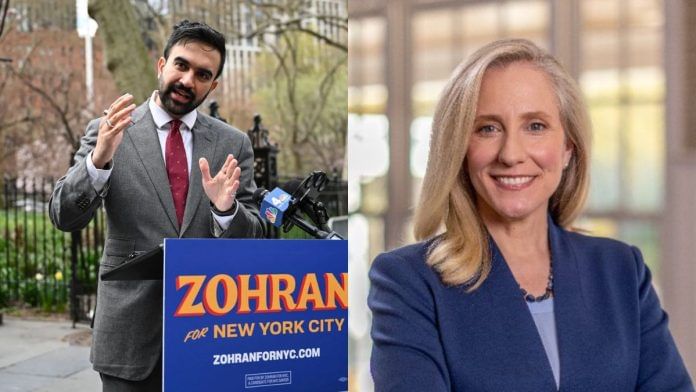New Delhi: US President Donald Trump’s victory juggernaut met a seemingly impenetrable wall of Democrats who seemed to have finally found a unifying message at their lowest ebb – ‘affordability’. However, beyond the headlines and victories in a few constituencies, they have a long way to go before they win the American voter back. Election of New York’s first Muslim mayor, Zohran Mamdani, a democratic socialist, at best, is an indication of how the Democrats will move in the run-up to next year’s midterms. They will hunt for that one leader who will best deliver that message.
For many, especially on the party’s Left, Tuesday night belonged to Mamdani. The 34-year-old has been in the limelight for his unapologetic progressive campaign in the deep blue city of New York. However, just a six-hour drive away, another Democratic—Abigail Spanberger—won the gubernatorial election to become Virginia’s first woman governor.
The different messaging and political ideologies within the Democrats have set up a potential conflict within the party a year before the 2026 midterms. Mamdani and Spanberger’s victory gave a new lease to Democratic politics that has promised to counter Trumpism. And that is why Democratic Socialists are ThePrint’s Newsmaker of the Week.
Mamdani, the Ugandan-born former musician, ran a campaign focused on making New York City affordable for its residents, with policies such as rent freezes, free buses, government grocery stores, and universal childcare. His campaign has energised swathes of voters within the Democratic Party across New York City. His victory speech indicated his willingness to take on Trump.
Spanberger, in contrast, focused on medical costs, building more houses, and lowering energy bills for Virginians. The governor-elect first gained national prominence in 2021 when she held then-President Joseph R. Biden Jr. accountable for the string of losses the Democrats suffered in that year’s elections.
The Democrats were shut out of Virginia’s main state offices in the 2021 polls, held a razor-thin majority in the House of Delegates, and set the stage for a string of losses that culminated in victories for Trump and the Republicans last year.
In direct contrast to Mamdani’s progressive campaign, Spanberger focused on projecting an image of competence and unflashy policies to solve the affordability crisis in Virginia.
“We sent a message to every corner of the Commonwealth, a message to our neighbours and our fellow Americans across the country. We sent a message to the whole world that in 2025, Virginia chose pragmatism over partisanship,” Spanberger declared in her victory speech Tuesday.
The governor-elect added, “You all chose leadership that will focus relentlessly on what matters most. Lowering costs, keeping our communities safe, and strengthening our economy for every Virginian. Leadership that will focus on problem-solving, not stoking division, we chose leadership that will always put Virginia first.”
Spanberger’s victory was not the sole win for the more centrist political figures within the Democratic Party. Mikie Sherrill won the gubernatorial polls in New Jersey and will become the state’s governor next year.
Also read: Mamdani must face blind spots of his Muslim identity—and the wrongs done in its name
Democrat vs Democrat
Tuesday night’s results mark a fork in the road for a party in the throes of an identity crisis. In the summer of 2015, a wind-swept Bernie Sanders at Burlington’s Waterfront Park—the city he represented as a mayor—announced his presidential run, exposing the ideological fissures within the Democratic Party that had been reshaped two decades earlier by William (Bill) Jefferson Clinton.
Railing against Wall Street, corporate greed, and gross income inequality across the US, Sanders built a movement that came close to winning the Democratic presidential primaries in 2016. The senator from Vermont won roughly 43 per cent of the votes during the primaries to 55 per cent of the votes cast in favour of eventual nominee Hillary Clinton.
Trump’s eventual victory that year set the stage for the rise of the “Squad” in the 2018 midterms. Alexandria Ocasio-Cortez (AOC), Ayanna Pressley, Ilhan Omar, and Rashida Tlaib, all unapologetically progressive and women of colour, set the stage with their victories and entered the House of Representatives. Sanders and the Squad become powerful voices against the top one per cent of the US from within the Democratic Party.
The growth of the progressive-Left among Democrats eventually met the impenetrable wall of the party—Nancy Pelosi—the first female Speaker of the House of Representatives. Pelosi’s ability to unify the various factions of the party saw the Democrats, despite the ideological differences, come together to pass important legislation, especially after Biden assumed the presidency in 2021, such as the Inflation Reduction Act (IRA).
Pelosi is now out, calling curtains to a successful four-decade career as a member of the House. The current leadership of the Democratic Party in the US House of Representatives was largely mentored by Pelosi.
However, despite the focus on winning power, the cracks between the party leadership and Mamdani’s candidature were clear. Hakeem Jeffries, the current minority leader in the House, endorsed Mamdani at the last moment, having waited nearly four months before backing his party’s nominee in the mayoral race for the city he represents.
The Senate Minority Leader, Chuck Schumer, also from New York City, did not endorse Mamdani throughout the campaign. The Mayor-elect received former President Barack Obama’s endorsement days before the 4 November elections, all indicating the current Democratic leadership’s reluctance to support the progressive faction of the party.
The stage is set for the Democrats’ internal reckoning as the Republican Party, led by Trump, processes its losses and turns its eyes toward the midterms next year.
Will it be Mamdani-style progressive politics? Or Spanberger’s centrist plank that wins out within the Democratic Party in the next year? Nevertheless, what remains clear is that the Democrats have a long road ahead in deciding their message for 2026, as they aim to counter Trump.
(Edited by Ratan Priya)






